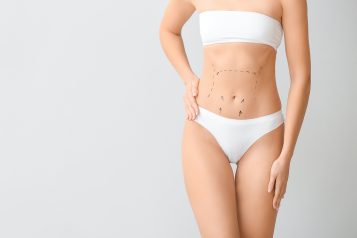
This article is sponsored by Pacira BioSciences, Inc.
“Zoom boom” – it’s a phenomenon that plastic surgeons across the country are noticing as Americans adjust to the reality that being on camera is now part of everyday life. According to the American Society of Plastic Surgeons, there were over 24 million cosmetic and reconstructive procedures in 2019, up approximately 2% from 2018. Although numbers for 2020 will not be available for a few more months, experts anticipate data will show a significant increase in plastic surgeries despite a national shutdown that put millions of elective procedures on hold. In my practice, we have seen a steady uptick in the demand for both surgical and non-surgical cosmetic procedures.
There are many reasons why plastic surgery may seem appealing in this “new normal” of living primarily online. First, many people have transitioned to a work-from-home environment and maybe staying home to work permanently. This means logging more time on video platforms such as Zoom, Teams, and FaceTime, which has fueled people’s critical perceptions of how they look on screen.
Secondly, the comfort and privacy of the extra time at home allows patients to recover from surgeries like breast augmentation or tummy tucks at their own pace. Additionally, mask-wearing has provided a convenient way to cover postoperative swelling in public. However, if you’re thinking about having a procedure, there’s an important topic you should discuss with your doctor that could help enhance the recovery process even more – pain management.
Why Is Pain Management So Important?
In my practice, I have alleviated patients’ concerns regarding a painful recovery by having discussions prior to surgery about pain management options and an enhanced recovery experience. This idea around enhanced recovery includes a focal point on pain management and specifically reducing opioids used during and after surgery. The goal is to have patients return home and get back to their daily routine as soon as possible. I began searching for alternatives to opioids when patients were reporting the side effects from opioids—like nausea, vomiting, constipation, dizziness, confusion, and drowsiness—impacted their recovery experiences. While physicians and patients have become more aware of the risks that come with taking opioids, far too many Americans don’t know that there are safe and effective non-opioid options available that can reduce or eliminate the need for opioids and their associated risks.
Ask About Your Options
Patients should feel empowered to have a proactive discussion with their healthcare provider about the range of pain management options available, including a non-opioid option such as EXPAREL® (bupivacaine liposome injectable suspension) that can effectively manage pain while potentially reducing or eliminating the need for opioids after surgery. According to a recent survey, 94% of healthcare providers agree that non-opioid pain management options can positively impact recovery and the ability to return to normal function following surgery by getting them home from the hospital sooner.
During a consultation for any procedure, I encourage my patients to ask about how their pain will be managed before, during, and after surgery. I make sure to explain how EXPAREL is injected during surgery (i.e., breast augmentation, abdominoplasty, etc.) to provide pain relief for the first few days after surgery when pain is often at its worst. Having these discussions during the initial consultations can help ease patients’ concerns from the beginning.
 Photo Credit: Adobe StockKnow What to Expect
Photo Credit: Adobe StockKnow What to Expect
If you’re a prospective patient, you should know what to expect from surgery. Ensure that your doctor is following recommendations from the CDC, which may include limiting in-office visits, conducting pre-surgical screenings, and requiring everyone to wear face masks. Overall, it’s imperative that doctors and patients foster a relationship that includes two-way, open dialogue early on in the process so that patients’ needs are met, and the end results of their procedures are positive. Keep in mind that the recovery process following plastic surgery differs from patient to patient, but the goal should always be to recover safely and quickly.
For more information, please visit www.EXPAREL.com/safety.
EXPAREL® (bupivacaine liposome injectable suspension) is indicated for single-dose infiltration in patients aged 6 years and older to produce postsurgical local analgesia and in adults as an interscalene brachial plexus nerve block to produce postsurgical regional analgesia. Safety and efficacy have not been established in other nerve blocks.
Important Safety Information
EXPAREL® (bupivacaine liposome injectable suspension) should not be used in obstetrical paracervical block anesthesia. In studies in adults where EXPAREL was injected into a wound, the most common side effects were nausea, constipation, and vomiting.
In studies in adults where EXPAREL was injected near a nerve, the most common side effects were nausea, fever, and constipation.
In the study where EXPAREL was given to children, the most common side effects were nausea, vomiting, constipation, low blood pressure, low number of red blood cells, muscle twitching, blurred vision, itching, and rapid heartbeat.
EXPAREL can cause a temporary loss of feeling and/or loss of muscle movement. How much and how long the loss of feeling and/or muscle movement depends on where and how much of EXPAREL was injected and may last for up to 5 days.
EXPAREL is not recommended to be used in patients younger than 6 years old for injection into the wound, for patients younger than 18 years old for injection near a nerve, and/or in pregnant women.
Tell your health care provider if you or your child has liver disease, since this may affect how the active ingredient (bupivacaine) in EXPAREL is eliminated from the body.
EXPAREL should not be injected into the spine, joints, or veins.
The active ingredient in EXPAREL can affect the nervous system and the cardiovascular system; may cause an allergic reaction; may cause damage if injected into the joints, and can cause a rare blood disorder.
PP-EX-US-6636























